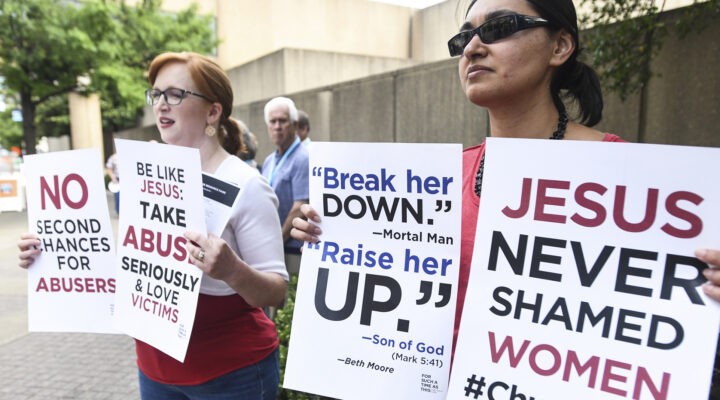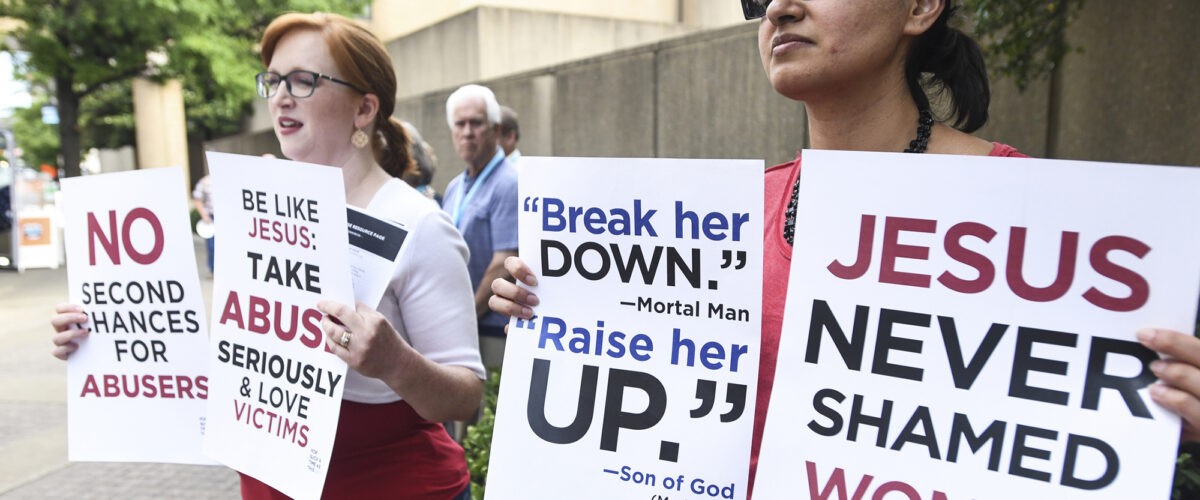A 29-page single-spaced memorandum originally obtained by Baptist News Global and subsequently made public by the survivor and advocate who authored it alleges at least 18 years of mishandling specific instances of sexual abuse by the Southern Baptist Convention Executive Committee. The allegations include resistance to meaningful abuse reform initiatives and the mistreatment and intimidation of survivors.
The memorandum, which also was sent to Guidepost Solutions — the firm currently conducting an independent investigation into the Executive Committee’s response to abuse survivors — describes all these instances with vivid detail and comprehensive documentation of correspondence between survivors and SBC officials, public statements and reports by various publications.
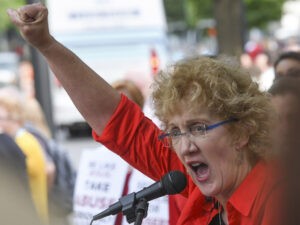
Christa Brown speaks during a rally in Birmingham, Ala., outside the Southern Baptist Convention’s 2019 annual meeting. Brown, an author and retired attorney, says she was abused by a Southern Baptist minister as a child. (AP Photo/Julie Bennett)
Christa Brown, the memorandum’s author, is a survivor, advocate and retired appellate attorney. The founder of the website StopBaptistPredators.org, Brown is a longtime online whistleblower and voice calling for reform of the SBC’s response to clergy sexual abuse. She is a former board member of the Survivors’ Network of those Abused by Priests, also known as SNAP, and currently serves on the board of advisors for the Child-Friendly Faith Project. Her own story involves a staff member at an SBC church in Texas who abused her and then was allowed to move to a series of other churches without consequence.
Much of the information contained in the memorandum previously had been made public by Brown. However, multiple instances of the Executive Committee’s alleged mishandling of abuse as documented by Brown never had been published prior to the release of the memorandum.
‘It would be the end of me!’
The first of these is Brown’s new allegation that in February 2008, a member of the Executive Committee called her to relay that he personally did not think she was evil.
This affirmation came amid controversy over comments made by former Southwestern Baptist Theological Seminary President Paige Patterson who, earlier that month, had accused SNAP of being “just as reprehensible as sex criminals.” Patterson also had made comments to the Florida Baptist Witness that Brown and others in SNAP had made “snap judgments.” The paper also accused her of making “guilt-by-association” charges.
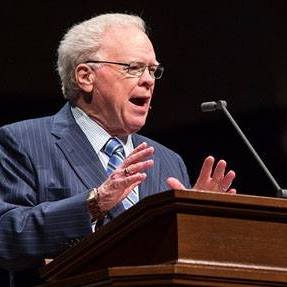
Paige Patterson
Brown wonders if Patterson had a hand in the article in question, which she called a “smear.” She surmises that Patterson made these comments because at the time, SNAP had recently sent a letter to Southwestern’s board of trustees calling for them to suspend Patterson and conduct an investigation into his covering for “reported serial predator” Darrell Gilyard.
The Executive Committee member, who is not named in the memorandum, ostensibly told Brown that while he did not think she was evil and he was appreciative of SNAP’s work, it never could be found out that he had spoken with her, going so far as to say, “It would be the end of me!”
Brown notes in the memorandum that such duplicity speaks of “the toxic culture in which no one felt able to confront leaders’ wrongdoing” in the SBC.
Baptist News Global reached out to Patterson for comment on this and other allegations in Brown’s document, but he declined to comment.
A call for immediate forgiveness
Next, sometime in the first half of 2008, Brown reportedly received yet another phone call from an Executive Committee member. This member detailed to Brown that he was sexually molested as a 15-year-old by a 16-year-old volunteer youth minister in his childhood church.
The member then told Brown that after he had been molested, he immediately forgave the boy who had abused him. Brown notes that the member emphasized the “immediate” aspect of his forgiveness before finally asking her why she hadn’t managed to forgive the man who had abused her.
Brown notes that the member emphasized the “immediate” aspect of his forgiveness before finally asking her why she hadn’t managed to forgive the man who had abused her.
This one-sided conversation went on for several minutes, she recalled, with the Executive Committee member getting progressively angrier at her. Then, after finishing his diatribe, the caller pleaded with Brown to promise she would not tell anyone else that they had spoken.
Deferring to the ‘experts’
The last of these never-before publicized interactions involves correspondence between Brown and former Executive Committee member Stephen Wilson, who at the time was vice president for academic affairs at Mid-Continent University in Mayfield, Ky. On Feb. 20, 2008, Brown received an email from Wilson. In it, Wilson stated that much of its content was “confidential” and that he was grateful that their previous conversations had “remained out of the public eye.”
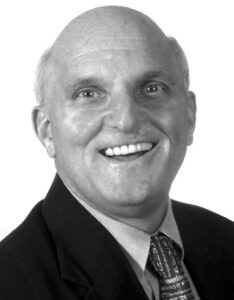
Stephen Wilson
Wilson stated that he checked Brown’s website daily and considered her to be one of the SBC’s “experts” on clergy sexual abuse — an assessment he hoped would be to her “amusement.” Brown states matter-of-factly in her memorandum that “it didn’t, because (the Executive Committee) had not actually consulted with me at all, and because I had previously suggested other experts who could help the SBC in creating effective institutional accountability structures.”
Wilson concluded the email by stating that a woman had reached out to him to relay her story of abuse. Instead of taking time to correspond with her, Wilson instead recommended that she reach out to Brown, not taking into consideration that Brown had no official connection to the SBC.
‘A terrible delay’
When asked what Brown would want to say to SBC leaders in view of the release of this memorandum and the new allegations it contains, Brown told BNG the following: “I would want to ask, ‘What are your thoughts? How do you explain that this has gone on for nearly two decades? Multiple Southern Baptist Convention presidents, Executive Committee presidents, ERLC leaders, and other high-level leaders have not only been aware of specific individual cases like mine, but have been very aware of the pattern. No one in SBC life can pretend that they didn’t know.”
Marshall Blalock, pastor of First Baptist Church of Charleston, S.C., and vice chair of the SBC’s Sexual Abuse Task Force, agreed to be interviewed for this story. He replied to Brown’s question, “I agree there has been a terrible delay in the response, the proper response — I should say the biblical response — to sex abuse in our convention at various levels.”
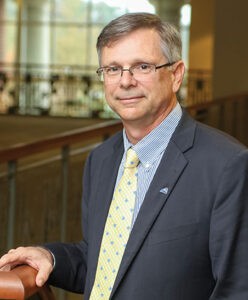
Marshall Blalock
Blalock sympathized with Brown’s frustrations and noted his personal “respect and appreciation” for her.
While Blalock could not answer specific questions about the allegations that were made in the memorandum, he stated that he was hopeful Guidepost Solutions would sufficiently address them.
“We have a very capable — amazingly capable — firm in Guidepost. If they have that memorandum, and you say they do, they’re on it. Our role is not to do the investigation, and we’re trying to give them every advantage we can,” Blalock said. “They will do an investigation that is credible, and when they’re finished, then we’ll have the opportunity to respond to their report.”
The problem of autonomy: Informing or intruding?
Brown remains adamant that meaningful action on clergy sexual abuse for the Southern Baptist Convention involves creation of an “independently resourced commission to assess abuse reports with some measure of objectivity and to keep records that could be shared with local churches.”
Some Southern Baptists, however, find such an idea to be a violation of the principle of local church autonomy. Brown, however, is not convinced by this objection. She explained that if such a commission were to be created by the SBC, it would be tasked with “informing local churches,” not “intruding.”
Brown also noted that while she does not have anything against Baptist polity, such an excuse from Southern Baptist leaders is often “nothing more than a pretext for their own impulses for institutional self-protection.”
A ‘tentacular’ institution
Brown concluded with some words for survivors in the SBC who may be skeptical of coming forward to assist Guidepost’s investigation and/or going public with their story.
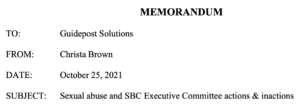 “Any skepticism is well-warranted,” she said. “I know. I get it. However, I believe that this investigation carries the potential to reveal a great deal more truth than anything we have ever seen before in this massive tentacular institution.”
“Any skepticism is well-warranted,” she said. “I know. I get it. However, I believe that this investigation carries the potential to reveal a great deal more truth than anything we have ever seen before in this massive tentacular institution.”
Brown believes if ordinary Southern Baptist parents in the pew knew that no one in the SBC is keeping a record of credibly accused and convicted sexual predators, and that there is no institutional framework to prevent childhood sexual abuse, they would be horrified. But telling the truth, Brown said, is the first step in ensuring that lasting reform is accomplished.
“I hold a fragile hope that more truth will be revealed,” Brown concluded before adding, “but not necessarily a hope that the SBC will take meaningful action. I will believe in their action when I see their action.”
Find help: If you or someone you know has been sexually abused, help is available 24/7 through the National Sexual Assault Hotline: 800-656-HOPE and online.rainn.org. If you or someone you know has information about alleged mishandling of sexual abuse reports by the SBC Executive Committee, contact Guidepost Solutions at [email protected].
David Bumgardner currently serves as a Clemons Fellow with BNG. He is a senior at Texas Baptist College, the undergraduate arm of Southwestern Baptist Theological Seminary and is a member at Cornerstone Baptist Church in Arlington, Texas. Follow him on Twitter @david_bumg.
Related articles:
Now we know why the SBC hasn’t acted more on sexual abuse | Opinion by Layne Wallace
SBC’s new reporting process again fails clergy sex abuse survivors. What’s needed is an independent review panel | Opinion by Christa Brown
SBC Sexual Abuse Task Force has lost one-third of its time to delays, but now the work may begin

